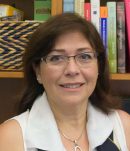Speaker: Luisa Iruela-Arispe, Ph.D.
Affiliation: Distinguished Professor of Molecular, Cell and Developmental Biology

Mechanosensation in Endothelial Cells
Our recently published work established NOTCH1 as an endothelial mechanosensor whose presence in the arterial vasculature is atheroprotective. We found that activation of NOTCH1 correlated with the applied shear stress level and that NOTCH signaling is required for the maintenance of cell-cell junctional integrity, flow induced endothelial alignment and suppression of proliferation. The finding that the full-length NOTCH1 protein polarizes at the downstream end of flow aligned endothelial cells open a series of additional questions: How do endothelial cells sense flow and orchestrate the polarization of NOTCH1 receptors? What is the biological significance of such polarization? Within 4 hours of flow, NOTCH1 is observed to cluster downstream and removal of flow results in disassembly of receptor clusters. Even during directed cell migration, NOTCH1 polarizes downstream of flow regardless of the direction of migration. Polarization of the protein can be reversed by simply reversing the flow direction to observe NOTCH1 translocate to the new downstream pole within 1 hour of flow reversal. Strategies to block protein synthesis with cycloheximide or Brefeldin A to collapse the Golgi apparatus do not prevent NOTCH1 re-polarization. Likewise, blocking clathrin mediated endocytosis or preventing NOTCH cleavage with a gamma-secretase inhibitor does not interfere with protein re-polarization kinetics suggesting that the receptor has the ability to mobilize in the plasma membrane across the length of the cell. Investigation of the potential contribution NOTCH ligands in this process revealed a similar polarization of JAG1 and co-localization with the NOTCH1 extracellular domain. Experiments using blocking antibodies against specific ligands found that preventing DLL1 and DLL4 binding resulted in silencing the downstream activation of HES1 under flow but did not affect NOTCH1 polarization. In contrast, blocking JAG1 had no change on downstream target activation. JAG1 was found to interact with NOTCH1 in cis at the downstream pole of flow aligned endothelial cells, suggesting a potential role for this ligand in preventing activation and contributing to stability of the receptor clusters. Analysis of the constellation of NOTCH1- interacting proteins through MS /proteomics combined with validation experiments indicate compartmentalization of NOTCH1 receptors in distinct areas of the endothelial membrane with different functional roles. Importantly, much of this compartmentalization is a consequence of laminar flow and reveals a complex molecular reorganization that prepares and protects cells from the effects of shear stress.
Biography:
Luisa Iruela-Arispe is a cell and developmental biologist and professor in the Department of Molecular, Cell and Developmental Biology. She earned her Ph.D. degree from the University of Sao Paulo in Brazil in 1989 and received post-doctoral training at the University of Washington in Seattle. She was appointed Assistant Professor at the Department of Pathology at Harvard Medical School in 1994 where she stayed for four years. In 1998, Dr. Iruela-Arispe joined the faculty of the Department of Molecular, Cell
and Developmental Biology at UCLA. Her research centers in understanding the molecular regulation of endothelial cell commitment and differentiation, patterning of the vasculature and homeostatic vascular function and has amounted to close to 200 peer-reviewed publications. This information has provided the basis to develop strategies to control vascular growth during disease, particularly in cancer. Dr. Iruela-Arispe is strongly committed to education. She held the position of Vice-Chair for Education in her Department for 11 years. Currently, she is the Chair for the Molecular Biology Inter-Departmental Program and Director of the Molecular Biology Institute. She is actively involved in her field of research and has organized several meetings including two Gordon Conferences, three Keystone Symposia, and the 2010 International Vascular Biology Meeting which took place at UCLA. She is the founder and director of the Vascular Biology Training Program at UCLA, continuously funded by the NIH since 2001.
Date/Time:
Date(s) - Oct 25, 2018
12:00 pm - 1:00 pm
Location:
Engineering V, Room 2101
410 Westwood Plaza Los Angeles CA 90095
